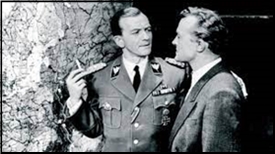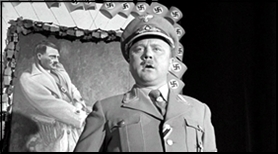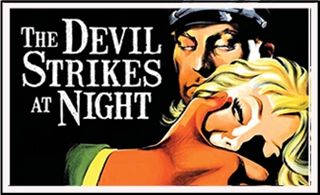Thu 26 May 2022
A Movie Review by David Vineyard: THE DEVIL STRIKES AT NIGHT (1957).
Posted by Steve under Crime Films , Reviews[2] Comments
THE DEVIL STRIKES AT NIGHT. West Germany, 1957. Zenith International Films, US. 1959. Originally released as Nacht, wenn der Teufel kam. Claus Holm, Mario Adorf, Hans Messemer, Peter Carsten, Carl Lange, Werner Peters, Annemarie Düringer, Monika John. Screenplay by Werner Jörg, from an article by Will Berthold. Directed by Robert Siodmak.

This fine West German film noir, by noir master Robert Siodmak (Phantom Lady) is based on a true story that bears an uncanny resemblance to a similar incident in the Soviet Union, a powerful condemnation and revealing expose of the twisted mindset of totalitarian governments regardless of their political leanings.
The time is the summer of 1944 with the West and the Russians both pushing forward and Germany under constant bombardment from Allied planes. Wounded hero Kommissar Axel Kersten (Claus Holm) has returned to Berlin from the Russian front sick of war and heroics with shrapnel in his leg and still less than enamored of his Nazi superiors, which is why he is less than happy when he is assigned a murder in Hamburg of a waitress, one Lucy Hansen (Monika John) by minor Nazi functionary Willi Keun (Werner Peters).
It seems all rather cut and dried. Keun frequently pestered and sexually harassed the woman, is known for being free with his hands with women, and her body was found in the doorway of his flat during an air raid with her neck broken. There is everything but an eyewitness to the murder.
But Kersten sees inconsistencies and we the viewer know Keun is innocent, however little we sympathize with him. The film is very careful not to allow the viewer to identify with Keun. He’s a small bureaucratic monster, just not a murderer. Saving him is an act of conscience and justice, not any virtue he possesses.

For Kersten the case doesn’t hold up either, not the least problem being the fact the soft Keun could not possibly have had the strength to strangle a healthy grown woman and shatter her hyoid bone with one hand. It just isn’t possible.
Further when he starts looking, he finds a series of murders in Hamburg dating back to before the war that suggests a serial killer, a madman, is stalking the women of the city.
Complicating things for Kersten is a developing romance with Helga Hornung (Annemarie Düringer) who has secrets of her own and pressure in from charming cynical SS Grupenfüher Rossdorf (Hans Messemer) who informs him in no uncertain terms that in Adolf Hitler’s Germany there is no such thing as a mentally degenerate serial killer and Willi Keun’s trial and certain conviction will be expedited.
There are a few spoilers here, but this is not a detective story or a suspense film really. It has element of those, but they aren’t the purpose here.

Kersten continues to push though and soon enough he discovers simple minded Bruno Lüdke (Mario Adorf) who has a reputation for hanging around women, but even when he has a confession from the real killer he may not be able to save Willi Keun from a corrupt bureaucracy and the State’s unwillingness to face reality while his actions expose him and Helga to increasing danger.
In the Nazi Germany of 1944 Bruno Lüdke simply cannot exist no matter how many women he murdered.
Ironic and intelligent, West Germany submitted this as their 1958 entry in the Best Foreign Film category at the Academy Awards. With a cast more familiar to American audiences than most (Messeemer, Carsten, and Peters in particular), a lean script, and Robert Siodmak at the helm having returned to his homeland after work in Hollywood dried up, The Devil Strikes at Night is a taut and cynical film that covers much of the same ground as much bigger productions like Night of the Generals, based on the bestselling Hans Helmut Kirst novel. The sheer banality of evil has seldom been as well presented.

Holm, Messemer, Adorf, and Peters are particularly effective with Holm’s decent man caught in a moral predicament easy to identify with. The almost Orwellian lengths a society is willing to go to to deny the truth, even at the cost of an innocent life and one of their own gives added weight to the film.
It would have been simple to make Willi Keun a sympathetic character and identify the viewer with him and Kersten’s attempt to save him, but this film chooses a more complex path with Keun a pathetic self-serving cog in the very machine that destroys him, and Kersten’s crusade to save him almost quixotic considering he represents everything Kersten loathes.
The grim reality of a few decent people in a society where madness is the norm trying to survive when national suicide is seen as heroic and inevitable makes this a powerful film and still effective.
It, and quite a few German Krimi films are currently available on YouTube with English subtitles, and while most of them are more along the lines of the somewhat campy Edgar Wallace films there are some gems among them worth looking into.

May 26th, 2022 at 11:10 pm
A compelling review, David, and a film I shall seek out, thanks to you!
May 27th, 2022 at 10:17 am
Same here, Dan.